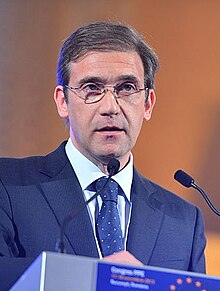
Back پيدرو پاسوس كويلهو ARZ Педру Пасуш Каэлью Byelorussian Педру Пасуш Коелю Bulgarian Pedro Passos Coelho BS Pedro Passos Coelho Catalan Pedro Passos Coelho Czech Pedro Passos Coelho Danish Pedro Passos Coelho German Πέδρο Πάσους Κοέλιου Greek Pedro Passos Coelho Esperanto
Pedro Passos Coelho | |
|---|---|
 Passos Coelho in 2012 | |
| Prime Minister of Portugal | |
| In office 21 June 2011 – 26 November 2015 | |
| President | Aníbal Cavaco Silva |
| Deputy | Paulo Portas |
| Preceded by | José Sócrates |
| Succeeded by | António Costa |
| President of the Social Democratic Party | |
| In office 9 April 2010 – 16 February 2018 | |
| Secretary-General | Luís Marques Guedes Miguel Relvas José Matos Rosa |
| Preceded by | Manuela Ferreira Leite |
| Succeeded by | Rui Rio |
| President of the Social Democratic Youth | |
| In office March 1990 – December 1995 | |
| Preceded by | Carlos Coelho |
| Succeeded by | Jorge Moreira da Silva |
| Member of the Assembly of the Republic | |
| In office 23 October 2015 – 28 February 2018 | |
| Constituency | Lisbon |
| In office 20 June 2011 – 22 October 2015 | |
| Constituency | Vila Real |
| In office 4 November 1991 – 24 October 1999 | |
| Constituency | Lisbon |
| Personal details | |
| Born | Pedro Manuel Mamede Passos Coelho 24 July 1964 Coimbra, Portugal |
| Political party | Social Democratic Party |
| Spouses | |
| Children | 3 |
| Education | Escola Secundária Camilo Castelo Branco |
| Alma mater | Lusíada University of Lisbon |
| Awards | |
| Signature | |
Pedro Manuel Mamede Passos Coelho (Portuguese pronunciation: [ˈpeðɾu mɐˈnwɛl mɐˈmɛðɨ ˈpasuʃ ˈkwɐʎu]; born 24 July 1964) is a Portuguese politician and university guest lecturer who was the 117th prime minister of Portugal, in office from 2011 to 2015. He was the leader of the Social Democratic Party (PSD) between 2010 and 2018.
Passos Coelho started very early in politics and was the national leader of the youth branch of PSD. He led the XIX Governo Constitucional (19th Constitutional Government of Portugal) and the XX Governo Constitucional (20th Constitutional Government of Portugal) as head of government from 21 June 2011 to 26 November 2015. His term in office oversaw the application of the European troika bailout to Portugal (requested by the previous Prime Minister, José Sócrates of the Socialist Party) and was marked by a wave of widespread austerity in both Portugal and abroad.[1][2][3]
- ^ EU austerity drive country by country, BBC (21 May 2012)
- ^ Zumbrun, Josh (7 November 2014). "The Federal Government Now Employs the Fewest People Since 1966". Wall Street Journal. ISSN 0099-9660. Retrieved 4 November 2021.
- ^ Hutchens, Gareth (4 January 2015). "Why this obsession with cutting public service jobs?". The Sydney Morning Herald. Retrieved 4 November 2021.
© MMXXIII Rich X Search. We shall prevail. All rights reserved. Rich X Search